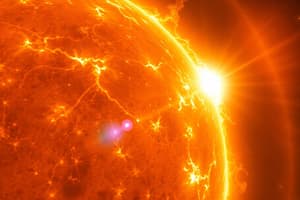Podcast
Questions and Answers
What is the radius of the core of the Sun when converted to pScale?
What is the radius of the core of the Sun when converted to pScale?
- 5.5 cm
- 17.5 cm (correct)
- 55.7012 cm
- 69.6265 cm
Which color corresponds to the radiation zone of the Sun?
Which color corresponds to the radiation zone of the Sun?
- White (correct)
- Blue
- Red
- Purple
At what distance from the center of the Sun is the photosphere located in pScale?
At what distance from the center of the Sun is the photosphere located in pScale?
- 69.7070 cm (correct)
- 55.7012 cm
- 69.6265 cm
- 17.5 cm
Which layer of the Sun is found at the greatest radius?
Which layer of the Sun is found at the greatest radius?
What is the color coding for the chromosphere in the diagram?
What is the color coding for the chromosphere in the diagram?
What phenomenon primarily occurs in the core of the Sun?
What phenomenon primarily occurs in the core of the Sun?
Which layer of the Sun is responsible for energy transport through radiation?
Which layer of the Sun is responsible for energy transport through radiation?
What are sunspots, solar flares, and prominences examples of?
What are sunspots, solar flares, and prominences examples of?
Approximately how long does it take for photons to traverse the radiative zone?
Approximately how long does it take for photons to traverse the radiative zone?
What is the appearance of the Sun's surface primarily due to?
What is the appearance of the Sun's surface primarily due to?
What type of star is the Sun classified as?
What type of star is the Sun classified as?
What process is responsible for the Sun producing energy?
What process is responsible for the Sun producing energy?
What is the average distance from the Earth to the Sun?
What is the average distance from the Earth to the Sun?
What is the primary characteristic of the photosphere?
What is the primary characteristic of the photosphere?
What are sunspots primarily caused by?
What are sunspots primarily caused by?
During what phenomenon is the chromosphere primarily visible?
During what phenomenon is the chromosphere primarily visible?
What is a characteristic feature of solar flares?
What is a characteristic feature of solar flares?
What temperature range is typically found in the corona?
What temperature range is typically found in the corona?
What causes the high temperature of the corona?
What causes the high temperature of the corona?
What effect can solar flares have on Earth?
What effect can solar flares have on Earth?
Which of the following describes prominences?
Which of the following describes prominences?
What primary process occurs in the sun's core?
What primary process occurs in the sun's core?
Why does it take a long time for photons to escape the radiative zone of the sun?
Why does it take a long time for photons to escape the radiative zone of the sun?
What is the photosphere and why is it considered the 'surface' of the sun?
What is the photosphere and why is it considered the 'surface' of the sun?
How does the temperature of the corona compare to that of the photosphere?
How does the temperature of the corona compare to that of the photosphere?
What are sunspots and how do they form?
What are sunspots and how do they form?
What implications do the energy transport mechanisms in the radiative and convective zones have on the sun's energy output?
What implications do the energy transport mechanisms in the radiative and convective zones have on the sun's energy output?
How might changes in the sun's magnetic field influence sunspot formation?
How might changes in the sun's magnetic field influence sunspot formation?
What would be the immediate consequence for Earth if nuclear fusion in the sun's core were to cease?
What would be the immediate consequence for Earth if nuclear fusion in the sun's core were to cease?
What is suggested about the influence of the sun's activity cycles on Earth's climate?
What is suggested about the influence of the sun's activity cycles on Earth's climate?
What are the implications of energy loss from the sun for Earth?
What are the implications of energy loss from the sun for Earth?
In the context of the sun's structure model, what is the purpose of the 'centerline' when creating the slice?
In the context of the sun's structure model, what is the purpose of the 'centerline' when creating the slice?
What scale is used for converting the radius of each layer of the Sun in the model?
What scale is used for converting the radius of each layer of the Sun in the model?
What is the first step in making a slice of the Sun according to the procedure?
What is the first step in making a slice of the Sun according to the procedure?
Which of the following is a limitation mentioned about studying the sun's impact?
Which of the following is a limitation mentioned about studying the sun's impact?
In constructing the scale model, how far should you measure to represent the width of the 15° slice from the center?
In constructing the scale model, how far should you measure to represent the width of the 15° slice from the center?
What does the procedure require you to do with the pieces of paper when creating the slice?
What does the procedure require you to do with the pieces of paper when creating the slice?
Flashcards
What is the Sun's core?
What is the Sun's core?
The central region of the Sun where nuclear fusion occurs, converting hydrogen into helium and releasing immense energy.
What is nuclear fusion?
What is nuclear fusion?
The process occurring in the Sun's core where hydrogen atoms fuse together to form helium, releasing vast amounts of energy.
What is the radiative zone?
What is the radiative zone?
The region surrounding the Sun's core where energy travels through radiation. Photons, emitted from the core, are absorbed and re-emitted by the dense plasma.
What is the convective zone?
What is the convective zone?
Signup and view all the flashcards
What is the photosphere?
What is the photosphere?
Signup and view all the flashcards
What is the chromosphere?
What is the chromosphere?
Signup and view all the flashcards
What is the corona?
What is the corona?
Signup and view all the flashcards
What are sunspots?
What are sunspots?
Signup and view all the flashcards
Photosphere
Photosphere
Signup and view all the flashcards
Sunspots
Sunspots
Signup and view all the flashcards
Solar Atmosphere
Solar Atmosphere
Signup and view all the flashcards
Chromosphere
Chromosphere
Signup and view all the flashcards
Solar Flares
Solar Flares
Signup and view all the flashcards
Prominences
Prominences
Signup and view all the flashcards
Corona
Corona
Signup and view all the flashcards
Solar Wind
Solar Wind
Signup and view all the flashcards
What is convection?
What is convection?
Signup and view all the flashcards
What would happen if the Sun's core stopped fusing hydrogen?
What would happen if the Sun's core stopped fusing hydrogen?
Signup and view all the flashcards
Nuclear Fusion
Nuclear Fusion
Signup and view all the flashcards
Sun's Core
Sun's Core
Signup and view all the flashcards
Radiative Zone
Radiative Zone
Signup and view all the flashcards
Convective Zone
Convective Zone
Signup and view all the flashcards
Study Notes
Sun's Structure
- The Sun is a middle-aged, medium-sized star, large enough to hold a million Earths.
- Ancient Greeks believed the Sun was a perfect sphere of fire. Modern understanding shows it's a variable star, its brightness changing due to rotation.
- It produces life-giving light and heat, along with harmful radiation.
- Average distance from Earth to Sun is 149,000,000 kilometers. It has visible features like sunspots, flares, and prominences.
- The Sun is a complex, multi-layered object. At its core, nuclear fusion of hydrogen atoms to helium releases tremendous energy.
- Energy travels through layers, primarily starting as gamma rays and gradually becoming visible light.
- The radiative zone is where energy travels through radiation. Photons are absorbed and emitted slowly, taking hundreds of thousands of years to traverse.
- The convective zone transports energy through convection currents, similar to boiling water. Hot plasma rises, cools, then sinks, creating a continuous cycle.
- The photosphere is the visible surface of the Sun, ~400 kilometers deep, at ~5,500 degrees Celsius. It's a layer of ionized gas. Sunspots are darker, cooler regions due to magnetic activity, varying in size and with an 11-year cycle.
- Above the photosphere is the chromosphere, visible during total solar eclipses. It's a layer of gas heated from below. Solar flares are intense bursts of energy, and prominences are large plasma structures extending thousands of kilometers.
- The corona is the outermost layer, an extremely hot plasma extending millions of kilometers. It's much hotter than the photosphere and thought to be heated by the sun's magnetic field. It's the source of the solar wind.
Sun's Energy Transport and Mechanisms
- The sun's core is where energy is generated through nuclear fusion.
- Energy travels from the core to the surface, through the radiative and convective zones.
- The radiative zone transports energy via radiation (photons).
- The convective zone transports energy via convection currents.
- The sun's magnetic field influences energy transport and the formation of features like sunspots, flares, and prominences.
Discussion Questions
- The primary process in the sun's core is nuclear fusion (hydrogen to helium), releasing enormous energy, crucial for life on Earth.
- Energy takes a long time to travel through the radiative zone due to the dense plasma absorbing and re-emitting photons in different directions.
- The photosphere is the visible surface of the sun, considered the sun's "surface." Sunspots are darker, cooler regions on this surface, associated with magnetic activity.
- The corona is much hotter than the photosphere (millions of degrees Celsius vs. thousands), heated by the Sun's magnetic field.
- The radiative and convective zones differ in their energy transport mechanisms (radiation vs. convection). This affects the sun's overall energy output.
Studying That Suits You
Use AI to generate personalized quizzes and flashcards to suit your learning preferences.




